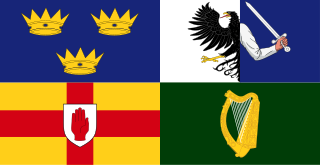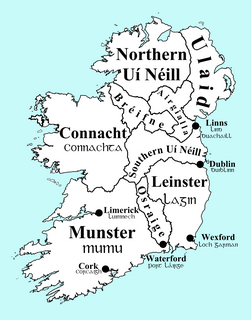Lee is a common surname in English-speaking countries.
Brennan is an Irish surname which is an Anglicised form of two different Irish language surnames—Ó Braonáin and Ó Branáin. Historically, one source of the surname was the prominent clan Ua Braonáin (O'Brennan) of Uí Duach (Idough) in Osraige who were a junior Dál Birn sept stemming from a younger son of Cerball mac Dúnlainge (d.888). Recent surname evaluations highlighted the geographic consistency of this lineage in the barony of Idough.

The Irish are a Celtic nation and ethnic group native to the island of Ireland, who share a common Irish ancestry, identity and culture. Ireland has been inhabited for about 12,500 years according to archaeological studies. For most of Ireland's recorded history, the Irish have been primarily a Gaelic people. Anglo-Normans conquered parts of Ireland in the 12th century, while England's 16th/17th-century (re)conquest and colonisation of Ireland brought a large number of English and Lowland Scots people to parts of the island, especially the north. Today, Ireland is made up of the Republic of Ireland and the smaller Northern Ireland. The people of Northern Ireland hold various national identities including British, Irish, Northern Irish or some combination thereof.

McMahon or MacMahon is an Irish surname. The surname arose separately in two areas: in west County Clare and in County Monaghan. The County Monaghan (Airgíalla) MacMahons are not related to the County Clare (Thomond) MacMahons.
Neil is a masculine given name of Gaelic origin. The name is an Anglicisation of the Irish Niall which is of disputed derivation. The Irish name may be derived from words meaning "cloud", "passionate", or "champion". As a surname, Neil is traced back to Niall of the Nine Hostages who was an Irish king and eponymous ancestor of the Uí Néill and MacNeil kindred. Most authorities cite the meaning of Neil in the context of a surname as meaning champion.
Quinn is an Anglicised form of the Irish Ó Coinn. The latter surname means "descendant of Conn". The surname Quinn is also rendered Ó Cuinn in Irish. The surname is borne by numerous unrelated Irish families in Ulster and the Irish counties of Clare, Longford, and Mayo. The most notable family of the name are that of Thomond, a Dalcassian sept, who derive their surname from Niall Ó Cuinn who was slain at the Battle of Clontarf in 1014. This family was formerly represented by the Earls of Dunraven. Another family is that seated in Annaly, who were related to the O'Farrell lords of Longford. Other families include one seated in Antrim; one seated in Raphoe; and one called Clann Cuain, seated near Castlebar. In the seventeenth century, the surname Quinn was common in Waterford. In 1890, the surname was numerous in Dublin, Tyrone, Antrim, and Roscommon. Quinn is one of the twenty most common surnames in Ireland. It is sometimes said that the surname Quinn is borne by Catholics whilst Quin is borne by Protestants.
Brian is a male given name of Irish and Breton origin, as well as a surname of Occitan origin. It is common in the English-speaking world. It is possible that the name is derived from an Old Celtic word meaning "high" or "noble". For example, the element bre means "hill"; which could be transferred to mean "eminence" or "exalted one". The name is quite popular in Ireland, on account of Brian Boru, a 10th-century High King of Ireland. The name was also quite popular in East Anglia during the Middle Ages. This is because the name was introduced to England by Bretons following the Norman Conquest. Bretons also settled in Ireland along with the Normans in the 12th century, and 'their' name was mingled with the 'Irish' version. Also, in the north-west of England, the 'Irish' name was introduced by Scandinavian settlers from Ireland. Within the Gaelic speaking areas of Scotland, the name was at first only used by professional families of Irish origin. It was the fourth most popular male name in England and Wales in 1934, but a sharp decline followed over the remainder of the 20th century and by 1994 it had fallen out of the top 100. It retained its popularity in the United States for longer; its most popular period there was from 1968–1979 when it consistently ranked between eighth and tenth. The name has become increasingly popular in South America - particularly Argentina and Uruguay since the early 1990s.
The surname McArdle or MacArdle was the twelfth most numerous in its homeland of County Monaghan in 1970. The surname in Irish is MacArdghail, from ardghal, meaning 'high valour' or from the Irish "ardghail" meaning "tall foreigner" with roots "ard" meaning "tall" and "gail" meaning "foreigner" indicative of their original ancestor being a Viking or from Viking stock. The surname is also common in County Armagh and County Louth.
Garvey and O'Garvey are Irish surnames, derived from the Gaelic Ó Gairbhith, also spelt Ó Gairbheith, meaning "descendant of Gairbhith". Gairbhith itself means "rough peace".

Martin may either be a surname or given name. Martin is a common given and family name in many languages and cultures. It comes from the Latin name Martinus, which is a late derived form of the name of the Roman god Mars, the protective godhead of the Latins, and therefore the god of war. The meaning is usually rendered in reference to the god as "of Mars", or "of war/warlike" ("martial").

Kelly is a surname in the English language. The name has numerous origins. In some cases it is derived from toponyms located in Ireland and Great Britain, in other cases it is derived from patronyms in the Irish language.
Hanratty is a surname, and may refer to:
Padraig Rushe is an Irish born Entrepreneur, Business Consultant and an accomplished musician. He is the Founder/Managing Director of Initiative Ireland (www.InitiativeIreland.com), a peer-to-peer lending company, which is currently in development. Rushe has held roles in Royal Bank of Scotland, Bank of Ireland and GE Money in addition to his own companies. He also served as Chief Commercial Officer of a Medical Device Company. A graduate of Trinity College Dublin, he earned his MBA in 2013. He also holds a BA Honours from University College Dublin.
King's County was a constituency represented in the Irish House of Commons until 1800. It corresponds with the modern County Offaly.
Cowell is a surname with multiple origins.
Drennan is a surname of Irish origin and is derived from the Gaelic Ó Draighnáin, meaning "grandson of blackthorn". Variant spellings include Drennen, Drinan, Drinnan, Drinnon, Drynan, and Drennon.
Clarke is an Anglo-Irish surname which means "clerk". The surname is of English and Irish origin but the original word comes from Latin for clericus. There are some surname variants, including the Clerk and Clark which predates Clarke by over 700 years. Clarke is also uncommonly chosen as a given name.
The North Monaghan by-election of 1907 was held on 20 June 1907. The by-election was held due to the resignation of the incumbent Irish Parliamentary MP, Patrick O'Hare. It was won by the Irish Parliamentary candidate James Carrige Rushe Lardner.





